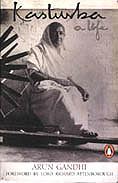Kasturba:
a life

Book
Review
By
Sara E. Ellis
Gandhi, Arun. Lord
Richard Attenborough. Kasturba:
a life
New Delhi: Penguin Books Ltd., 2000.
315 pp, 295 Indian Rs, US $22.51
January 29, 2002
Arun Gandhi, grandson to Mohandas and Kasturba, has
written a thorough account of Kasturba's life. Arun
begins with a description of Kasturba's childhood in
Porbandar in the late1800s, before she met Mohandas. By
having chosen to embark on difficult research into his
grandmother's life, including her first years which are
not well-documented, Arun ensures that the reader
receives an intimate and life-long portrait of this
amazing woman.
Kasturba is presented as a lively woman &endash;
obedient, yet with a mind of her own. As the relationship
between Kasturba and Mohandas developed, Arun maintains
that Kasturba's influence over Mohandas in her own quiet
way also grew, to which some of Mohandas' writings also
attest.
Arun paints a vivid picture of the beginnings of
Mohandas' non-violence movement in South Africa, a
chapter of Mohandas' life that is not well-publicized,
and emphasises Kasturba's helpful and caring role
throughout the events. Although at first resistant to the
Ashram and some of the Mohandas' new thoughts, Kasturba
found that she too believed in her husband's convictions
and ideas.
The major emphasis in the book is on Kasturba's
never-failing patience with her husband, her obedience to
him, as well as the authority she herself exerted. As
"the Mahatma's wife", Kasturba undertook many projects,
including teaching hygiene, upon their return to India.
And even before that, we learn that she was just as
devoted to the peace movement as her husband, for example
in South Africa where she decided to be arrested (along
with a group of women) for the Satyagrahi movement. She
is presented as a strong and courageous woman, a true
match for Mohandas.
Arun does his best to write a comprehensive biography
about Kasturba; however, the book focuses a great deal on
Mohandas and the events that shaped his life. After these
descriptions, a supposition of what Kasturba would have
done or thought at the same time is given. Although these
divergences were probably necessary due to lack of "hard"
evidence for many aspects of Kasturba's life, the reader
begins to feel that it is mainly a book about Mohandas,
with Kasturba as an important "side-thought".
Towards the end of the biography, and Kasturba's life,
her actions, thoughts, and moods are brought to the
forefront. This shift in focus is due to the availability
of first-hand reports from family and friends who were
still alive when Arun was doing research for the book.
Even Arun shares his memories of his beloved grandmother
with the reader. In my opinion, the details provided on
Kasturba towards the end of her life, were rich and full
of meaning for one wanting to discover more about the
person who was "the Mahatma's wife". The first-hand
accounts, plus documentation of Kasturba's activities in
newspapers, Mohandas' writings, and other publications
show Arun's sincere desire to give an accurate and
life-like portrayal of this amazing woman. The
descriptions of Kasturba's relations with Mohandas and
all others that she meets do not lack that important
touch of reality and humanity that speak to the reader
and help him/her to understand what it was like to be
Kasturba.
Kasturba: a life is a thoroughly enjoyable read,
especially for those who are curious about the role
Kasturba played in "the Mahatma's" life and wish to know
more about her upbringing, beliefs, adult/family life,
and the influence she had on the non-violence
movement.
Copyright ©
2002 TFF & author

Order the book here:
Arun
Gandhi's Kasturba: a life

Tell a friend about this article
Send to:
From:
Message and your name
Back
to NONVIOLENCE
FORUM
|
|